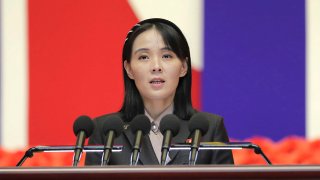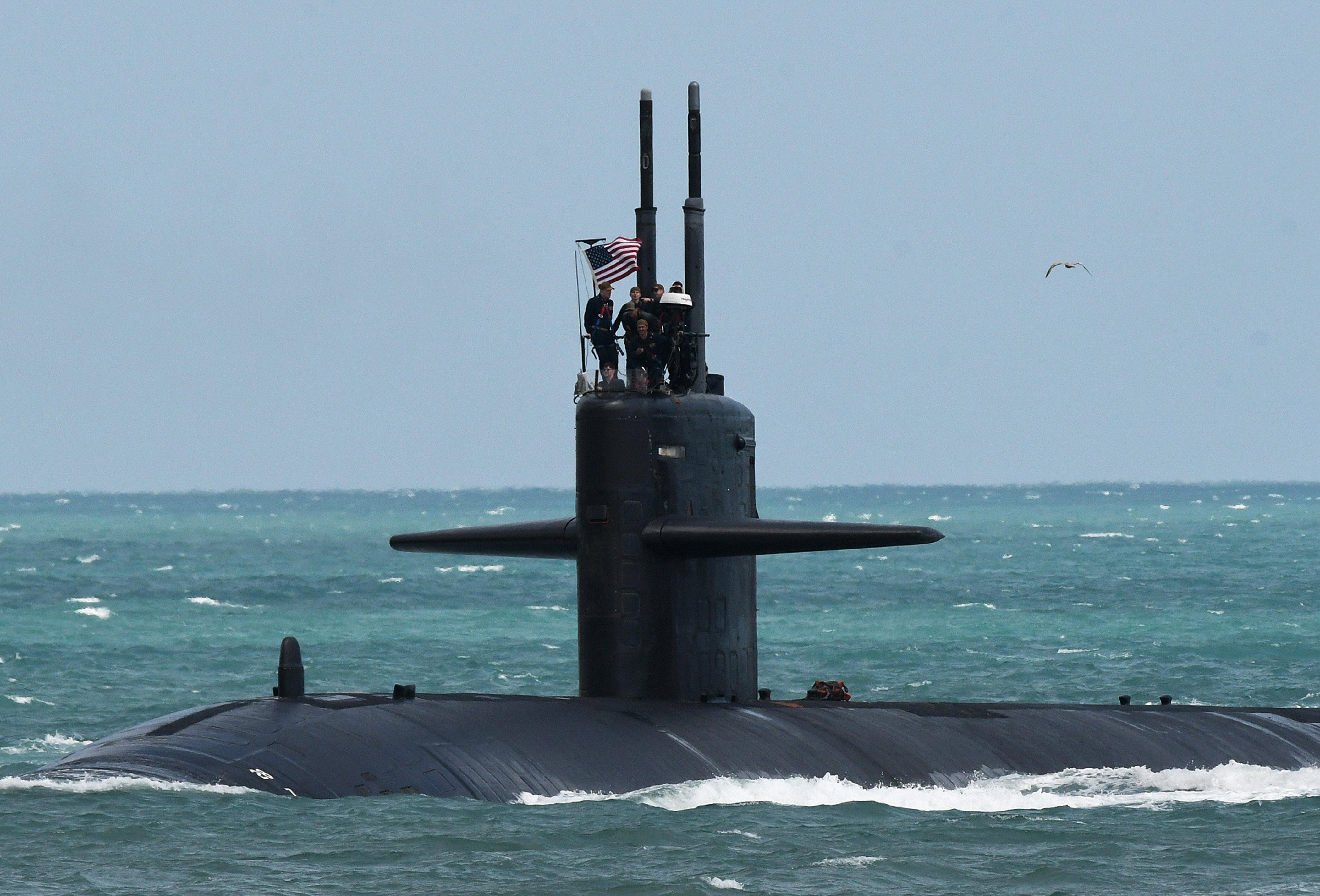
The powerful sister of North Korea’s leader says her country would stage more provocative displays of its military might in response to a new U.S.-South Korean agreement to intensify nuclear deterrence to counter the North’s nuclear threat, which she insists shows their “extreme” hostility toward Pyongyang.
Kim Yo Jong also lobbed personal insults toward U.S. President Joe Biden, who after a summit with South Korean President Yoon Suk Yeol on Wednesday stated that any North Korean nuclear attack on the U.S. or its allies would “result in the end of whatever regime” took such action.
Biden’s meeting with Yoon in Washington came amid heightened tensions in the Korean Peninsula as the pace of both the North Korean weapons demonstrations and the combined U.S.-South Korean military exercises have increased in a cycle of tit-for-tat.
Get Philly local news, weather forecasts, sports and entertainment stories to your inbox. Sign up for NBC Philadelphia newsletters.
Since the start of 2022, North Korea has test-fired around 100 missiles, including multiple demonstrations of intercontinental ballistic missiles designed to reach the U.S. mainland and a slew of short-range launches the North described as simulated nuclear strikes on South Korea.
North Korean leader Kim Jong Un is widely expected to up the ante in coming weeks or months as he continues to accelerate a campaign aimed at cementing the North’s status as a nuclear power and eventually negotiating U.S. economic and security concessions from a position of strength.
During their summit, Biden and Yoon announced new nuclear deterrence efforts that call for periodically docking U.S. nuclear-armed submarines in South Korea for the first time in decades and bolstering training between the two countries. They also committed to plans for bilateral presidential consultations in the event of a North Korean nuclear attack, the establishment of a nuclear consultative group and improved sharing of information on nuclear and strategic weapons operation plans.
In her comments published on state media, Kim Yo Jong said the U.S.-South Korean agreement reflected the allies’ “most hostile and aggressive will of action” against the North and will push regional peace and security into “more serious danger.”
Kim, who is one of her brother’s top foreign policy officials, said the summit further strengthened the North’s conviction to enhance its nuclear arms capabilities. She said it would be especially important for the North to perfect the “second mission of the nuclear war deterrent,” in an apparent reference to the country’s escalatory nuclear doctrine that calls for preemptive nuclear strikes over a broad range of scenarios where it may perceive its leadership as under threat.
She lashed out at Biden over his blunt warning that North Korean nuclear aggression would result in the end of its regime, calling him senile and “too miscalculating and irresponsibly brave.” However, she said the North wouldn’t simply dismiss his words as a “nonsensical remark from the person in his dotage.”
“When we consider that this expression was personally used by the president of the U.S., our most hostile adversary, it is threatening rhetoric for which he should be prepared for far too great an after-storm,” she said.
“The more the enemies are dead set on staging nuclear war exercises, and the more nuclear assets they deploy in the vicinity of the Korean Peninsula, the stronger the exercise of our right to self-defense will become in direct proportion to them.”
She called Yoon a “fool” over his efforts to strengthen South Korea’s defense in conjunction with its alliance with the United States and bolster the South’s own conventional missile capabilities, saying he was putting his absolute trust in the U.S. despite getting only “nominal” promises in return.
“The pipe dream of the U.S. and (South) Korea will henceforth be faced with the entity of more powerful strength,” she said.
South Korea’s Unification Ministry, which handles inter-Korean affairs, described her comments as “absurd” and insisted that they convey the North’s “nervousness and frustration” over the allies’ efforts to strengthen nuclear deterrence.
Kim Yo Jong’s comments toward Biden were reminiscent of when her brother called former U.S. President Donald Trump a “mentally deranged U.S. dotard” while they exchanged verbal threats during a North Korean testing spree in 2017 that included flight tests of ICBMs and the North’s sixth nuclear test.
Kim Jong Un later shifted toward diplomacy and held his first summit with Trump in Singapore in June 2018, where they issued aspirational goals for a nuclear-free Korean Peninsula without describing when and how it would occur.
But their diplomacy never recovered from the collapse of their second summit in February 2019 in Vietnam, where the Americans rejected North Korean demands for major sanctions relief in exchange for a limited surrender of their nuclear capabilities.
Kim Yo Jong did not specify the actions the North is planning to take in response to the outcome of the U.S.-South Korea summit.
Kim Dong-yub, a professor at the University of North Korean Studies in Seoul, said the North will likely dial up military exercises involving its purported nuclear-capable missiles to demonstrate pre-emptive strike capabilities. The North may also stage tests of submarine-launched ballistic missile systems in response to the U.S. plans to send nuclear-armed submarines to the South, he said.
Kim Jong Un said this month that the country has built its first military spy satellite, which will be launched at an unspecified date. The launch would almost certainly be seen by its rivals as a banned test of long-range missile technology.
In March, he called for his nuclear scientists to increase production of weapons-grade material to make bombs to put on his increasing range of nuclear-capable missiles, as the North unveiled what appeared to be a new warhead possibly designed to fit on a variety of delivery systems. That raised questions on whether the North was moving closer to its next nuclear test, which U.S. and South Korean officials have been predicting for months.
North Korea has long described the United States’ regular military exercises with South Korea as invasion rehearsals, although the allies described those drills as defensive. Many experts say Kim likely uses his rivals’ military drills as a pretext to advance his weapons programs and solidify his domestic leadership amid economic troubles.
Facing growing North Korean threats, Yoon has been seeking stronger reassurances from the United States that it would swiftly and decisively use its nuclear weapons if the South comes under a North Korean nuclear attack.
His government has also been expanding military training with the U.S., which included the allies’ biggest field exercises in years last month and separate drills involving a U.S. aircraft carrier battle group and advanced warplanes, including nuclear-capable B-52 bombers and F-35 fighter jets.



